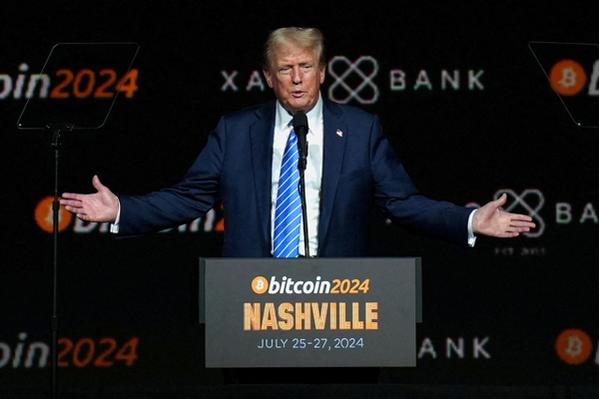Trump's Victory Drives South Korean Investors to Overseas Markets
Following Donald Trump's successful bid for a second term as U.S. President, a surge of 2.8 trillion won (approximately $1.99 billion) flowed into overseas exchange-traded funds (ETFs) within just four days, while domestic investment funds experienced outflows. Stock market analysts expect continued decoupling between U.S. and domestic stock markets for a while, fueled by optimism for Trump's 'America First' policies.

According to data from the Korea Financial Investment Association (KOFIA) on Nov. 12, total net assets for domestic ETFs investing in foreign assets, including stocks, bonds, and real estate, reached 58.28 trillion won on Nov. 11, up 2.79 trillion won from 55.49 trillion won on Nov. 5, the day right before Trump's re-election was confirmed. During the same period, the total net assets across the domestic ETF market rose only from 163.51 trillion won to 165.02 trillion won, an increase of 1.51 trillion won, highlighting the particularly rapid growth in overseas investment ETFs. Of the total increase in overseas investment ETF net assets, equity funds saw a jump from 33.41 trillion won to 35.69 trillion won, up by 2.28 trillion won, accounting for 81.7 percent of the overall increase.
In contrast to the growth seen in overseas investment products, domestic asset-focused ETFs saw a net decrease. According to the KOFIA, the total net assets of domestic ETFs dropped from 108.02 trillion won on Nov. 5 to 106.75 trillion won by Nov. 11, marking a decline of 1.28 trillion won. Over 1 trillion won was withdrawn from domestic ETFs in a single day on Nov. 11 alone. Notably, equity fund net assets fell sharply from 38.16 trillion won to 36.64 trillion won, a reduction of 1.52 trillion won. Within just four trading days, the difference in net assets between foreign and domestic equity ETFs narrowed significantly from 4.75 trillion won to 956.4 billion won.
Recently, overseas investment products drawing substantial capital inflows were not limited to ETFs. Net assets in overseas investment mutual funds also surged by 4.19 trillion won, climbing from 105.29 trillion won on Nov. 5 to 109.48 trillion won on Nov. 11.
Stock market experts attribute this rapid shift in capital from domestic to overseas ETFs to Trump's 'America First' policies, which are expected to negatively impact key South Korean industries, including semiconductors and secondary batteries. On Nov. 11 (local time), while the U.S. stock market, buoyed by the so-called 'Trump Rally,' hit record highs across all three major indices, South Korea's KOSPI index continued its decline, dipping below the 2,500 mark for the first time in three months since Aug. 5.
Given the current market climate, domestic securities firms also appear more optimistic about the growth potential of U.S. stock investment products over South Korean equity ETFs. Both Samsung Asset Management and Shinhan Asset Management's U.S. AI energy ETFs surpassed net assets of 100 billion won and 50 billion won, respectively, as of Nov. 11. Samsung's 'KODEX U.S. AI Electric Power Core Infrastructure ETF' had achieved a return of 27.7 percent as of Nov. 11 since its July 9 listing, with its largest holding, U.S. power grid firm GE Vernova, rising 18.3 percent since the election. Retail investors have accumulated 39.7 billion won in net purchases of this ETF since its launch.
Shinhan's 'SOL U.S. AI Electric Power Infrastructure ETF' saw returns of 21.44 percent over the past month and 47.77 percent over the past three months as of Nov. 11, outperforming all 37 domestic AI-related ETFs. The net purchases by retail investors over the last month grew more than 15-fold, reaching 23.6 billion won. Additionally, Mirae Asset Management's 'TIGER U.S. S&P500 ETF' and 'TIGER U.S. NASDAQ100 ETF' became the first and second foreign stock-focused products to surpass 5 trillion won and 4 trillion won in net assets on Nov. 6 and 7, respectively.
Han Ji-young, an analyst at Kiwoom Securities, noted, 'There is widespread concern that Trump's protectionism will negatively impact South Korea's export-dependent stock market, similar to the U.S.-China trade conflict in 2018,' adding, 'We may soon enter a phase where the feasibility of the 'Trump Trade,' which refers to investing in stocks expected to benefit from Trump's policies, is reassessed.' Kim Jung-hyun, office head of ETF investment division at Shinhan Asset Management, predicted that 'the Trump administration's second-term policies will focus on securing efficient energy sources and modernizing outdated power grids.'









Comments